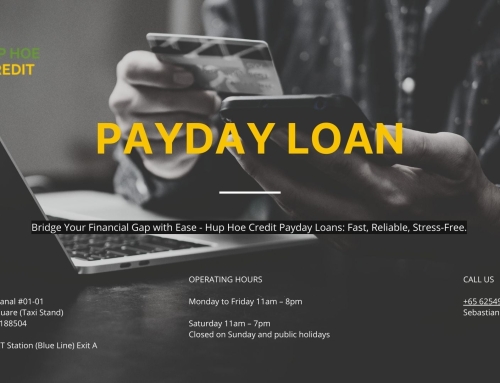Did you know that in Singapore, the average amount borrowed through payday loans is a staggering $1,500 per person?
Payday loans have become increasingly popular in Singapore as a quick solution for individuals facing unexpected expenses or temporary financial difficulties. These short-term, unsecured loans offer a way to bridge the gap between paychecks and provide immediate funds to cover urgent needs. However, it is crucial to understand the fundamentals of payday loans, the application process, the associated costs, and the alternatives available.
The Fundamentals of Payday Loan
To qualify for a payday loan in Singapore, borrowers usually need to meet several eligibility criteria. These requirements may include being a Singaporean or permanent resident, being at least 18 years old, having a steady source of income, and providing proof of identity and residency. Different lenders may have specific eligibility criteria, so it’s advisable to check with the lender directly before applying for a payday loan.
Payday loans generally offer smaller loan amounts compared to other types of loans, ranging from a few hundred dollars to a few thousand dollars. The repayment period for payday loans is typically shorter, often ranging from a few days to a few months. It’s crucial to borrow only what you need and ensure that you can repay the loan within the agreed-upon time frame, as late payments may result in additional fees or penalties.
How Payday Loans Work
Applying for a payday loan in Singapore is a simple process that can be done either online or in person. To start the application, borrowers are usually required to complete an online form or provide the necessary documentation at the lender’s office.
Application Process
The application process typically involves providing personal and financial information. This may include identification documents, proof of income, and bank statements. Lenders use this information to assess the borrower’s creditworthiness and determine their eligibility for the loan.
Once the application is submitted, the lender reviews the information provided and makes a decision on the loan application. If approved, the loan amount requested is usually disbursed to the borrower on the same day, providing quick access to funds.
Interest Rates and Fees
Payday loans in Singapore generally come with higher interest rates compared to other types of loans. It is important for borrowers to compare interest rates among lenders to find the most competitive terms. Additionally, payday loans may also have administrative fees, late payment fees, and other charges.
Borrowers should carefully review the loan agreement and understand all the associated costs before accepting the loan. Being aware of the interest rates and fees helps borrowers make informed decisions and avoid any unexpected financial burdens.
Pros and Cons of Payday Loans in Singapore
Payday loans in Singapore have their own set of advantages and disadvantages. Understanding these pros and cons can help borrowers make informed decisions when considering a payday loan.
Pros of Payday Loans
Quick Access to Funds: Payday loans offer fast access to funds, allowing borrowers to address their urgent financial needs promptly. With minimal documentation requirements and a simplified application process, payday loans can provide the necessary funds in a timely manner.
Accessibility: Payday loans are often available to individuals with lower credit scores or limited credit history. This makes them accessible to a broader range of borrowers who may not qualify for traditional bank loans.
Convenience: The process of applying for a payday loan is typically straightforward and convenient. Borrowers can complete the application online or visit a lender’s office in person, making it easier to access the funds they need.
Cons of Payday Loans
High Interest Rates: One of the notable drawbacks of payday loans is the high interest rates associated with them. If the loan is not repaid on time, these high interest rates can lead to significant borrowing costs, increasing the financial burden on the borrower.
Additional Fees and Penalties: Late payments or failure to repay the loan within the agreed-upon time frame can result in additional fees and penalties. This can further worsen the borrower’s financial situation and make it even more challenging to repay the loan.
Potential Debt Cycle: Relying on payday loans as a long-term financial solution can create a cycle of debt for individuals who struggle to repay the loans in full. The short repayment period and high costs may lead to repeated borrowing, exacerbating the individual’s financial problems.
Comparing Payday Loans to Other Types of Loans
When exploring borrowing options, it’s important to understand the differences between different types of loans. In this section, we will compare payday loans to personal loans and credit cards to help you make an informed decision based on your financial needs and circumstances.
Payday Loans vs. Personal Loans
Payday loans and personal loans serve different purposes and have distinct features. Payday loans are typically smaller in amount and have shorter repayment periods. They are designed to provide immediate access to cash for individuals facing temporary financial emergencies. On the other hand, personal loans offer larger loan amounts and longer repayment terms. Personal loans may require a more rigorous application process and can involve a credit check.
When considering payday loans vs. personal loans, borrowers should assess their financial needs, repayment capabilities, and the associated costs. Payday loans may be more accessible to individuals with lower credit scores, while personal loans may offer more flexible borrowing options for larger expenses. It’s essential to carefully consider the terms and conditions of each loan and choose the option that aligns with your financial situation.
Payday Loans vs. Credit Cards
Another comparison to consider is between payday loans and credit cards. Payday loans provide immediate access to cash, offering a lump sum amount that is typically repaid in a short period. In contrast, credit cards offer a revolving line of credit that can be used for various purchases and repaid over time. Credit cards often come with lower interest rates, and some may offer rewards or benefits based on the card issuer.
Payday loans do not require a credit check, making them more accessible to individuals with poor or limited credit history. On the other hand, credit cards may require a credit check during the application process. When deciding between a payday loan vs. credit card, borrowers should consider their specific needs and financial situation. It’s important to evaluate the interest rates, repayment terms, and any associated fees or rewards offered by credit cards before making a decision.
Alternatives to Payday Loans
When faced with financial challenges, there are alternatives to payday loans that can help individuals avoid unnecessary borrowing. Exploring these options can not only save money but also provide a more sustainable long-term financial strategy. Two popular alternatives to payday loans are personal savings and borrowing from family or friends.
Personal Savings
Building and maintaining a personal savings fund can be a reliable alternative to payday loans. By regularly setting aside a portion of their income, individuals can create a financial safety net to cover unexpected expenses or emergencies. Personal savings offer the advantage of not incurring interest charges or fees associated with borrowing. Establishing an emergency fund is a proactive approach that can help individuals avoid the need for payday loans and reduce financial stress in the long run.
Borrowing from Family or Friends
Another alternative to payday loans is reaching out to family or friends for financial assistance. Borrowing from loved ones can provide a more flexible and potentially interest-free loan option. However, it’s crucial to approach these arrangements with open communication and clear repayment terms to avoid straining relationships. Borrowers should also consider the impact that borrowing from family or friends may have on their personal dynamics and make sure they are comfortable with the arrangement.
Best Practices for Payday Loan Borrowers
Borrowing only what you need for a payday loan is crucial to avoid unnecessary interest charges and repayment difficulties. Resisting the temptation to borrow more than necessary will help you manage your finances responsibly. Carefully assess your financial needs and determine the minimum amount required to address your immediate expenses.
Borrow Only What You Need
When taking out a payday loan, it’s important to borrow only the amount necessary to cover your immediate expenses. Borrowing more than you need can result in higher interest charges and may lead to difficulties in repayment. By carefully evaluating your financial needs, you can avoid unnecessary costs and effectively manage your loan.
Understand the Terms
Before agreeing to a payday loan, it’s essential to thoroughly read and understand the terms and conditions. Pay close attention to the interest rates, fees, and repayment schedule outlined in the loan agreement. If you have any questions or concerns, don’t hesitate to seek clarification from the lender. Being fully informed about the loan terms will enable you to make responsible borrowing decisions and prevent unexpected costs from arising.
Conclusion
Payday loans in Singapore can offer a quick and convenient solution for individuals facing immediate financial needs. However, it is crucial to approach these loans with caution and carefully consider the associated costs and repayment terms. While payday loans may provide short-term relief, exploring alternative options like personal savings or borrowing from family and friends can be more favorable in the long run.
By understanding the fundamentals of payday loans and comparing them to other types of loans, borrowers can make informed decisions about their financial situation. It’s important to borrow only what is absolutely necessary and ensure that the loan can be repaid within the agreed-upon time frame. Reading and understanding the loan terms, including interest rates and fees, is essential to avoid any surprises and manage finances responsibly.
Ultimately, individuals should evaluate their options and choose the borrowing method that aligns with their needs and financial circumstances. Payday loans can be a valuable resource in times of emergencies, but it’s essential to exercise caution and consider all available alternatives before making a decision. By adopting responsible borrowing practices and being mindful of the associated costs, individuals can navigate their financial challenges with confidence.
FAQs – Payday Loan
What is a payday loan?
A payday loan is a short-term, high-interest loan, typically due on your next payday. It’s designed to bridge the gap for borrowers facing immediate financial needs, but it comes with risks including high fees and the potential for repeat borrowing cycles.
How to get out of payday loan debt?
To get out of payday loan debt, consider negotiating the terms with the lender, seeking help from a reputable credit counselor, or exploring debt consolidation options. Alternatively, setting up a payment plan that fits your budget can gradually reduce the debt.
How to get a payday loan with a prepaid card?
To obtain a payday loan with a prepaid card, find a lender that accepts this method. You will need to provide your personal details and have the prepaid card registered in your name. The loan amount will then be loaded onto the card following approval.
How much would a $500 payday loan cost?
The cost of a $500 payday loan varies by lender and state regulations but typically includes a substantial fee. For example, if the lender charges $15 for every $100 borrowed, a $500 loan would cost $75 in fees, making the total repayment amount $575.





